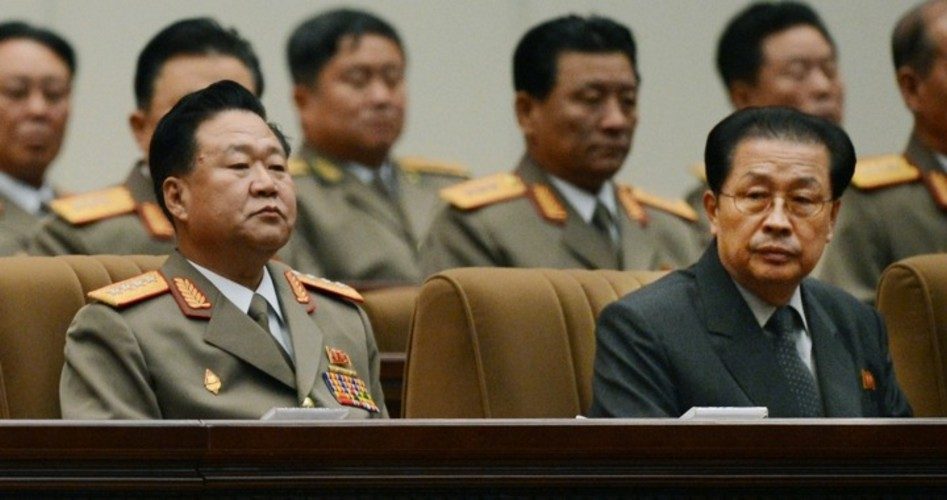
Nam Jae-Joon, the head of South Korea’s National Intelligence Service, briefing his National Assembly’s intelligence committee on December 23, disputed the official line that Jang Song-thaek (shown, front right), the uncle of the North Korean leader, Kim Jong-un, was executed because he had been plotting a coup.
Jang was married to Kim Kyong-hui, the only sister of former North Korean supreme leader Kim Jong-il, and the aunt of Kim Jong-un, the present supreme leader of North Korea, who succeeded his father.
North Korea’s state-controlled media announced on December 12 that Jang had been executed. The government released a 2,700-word statement, indiscreetly charging that the “despicable human scum Jang, who was worse than a dog, perpetrated thrice-cursed acts of treachery in betrayal of such profound trust and warmest paternal love shown by the party and the leader for him.”
The Pyongyang government accused Jang of having committed “anti-party, counter-revolutionary factional acts,” including having illicit affairs with women, harboring “politically-motivated ambition,” weakening “the party’s guidance over judicial, prosecution and people’s security bodies,” and obstructing “the nation’s economic affair.” Jang had been vice chairman of the National Defense Commission, chairman of the State Physical Culture and Sports Guidance Commission, and chief of the Central Administrative Department of the Workers’ Party of Korea, the communist state’s ruling party.
In Monday’s briefing before the intelligence committee, however, Nam offered an explanation for Jang’s fall from grace that differed from the official statement put out by Pyongyang. According to Nam, Jang and his business associates had made enemies within North Korea’s ruling establishment by dominating very profitable areas of the nation’s economy, including the sale of North Korean coal to China. “There had been friction building up among the agencies of power in North Korea over privileges and over the abuse of power by Jang Song-thaek and his associates,” Nam was quoted in a New York Times report.
Jeong Cheong-rae and Cho Won-jin, two legislators serving as spokesmen for the parliamentary committee briefed by Nam, said that Nam told them that Jang’s rivals had gone to his nephew (the North’s ruler, Kim Jong-un) with accusations of corruption on the part of Jang and his associates. When Kim ordered Jang’s business partners to cease some of their activities, they balked, perhaps confident that Jang’s relationship with his nephew would protect them from prosecution. However, they were wrong. Kim saw their refusal to cooperate as a challenge to his authority, according to Nam.
“It appears that there is no big problem with Kim Jong-un’s grip on power, because the purge of Jang Song-thaek was not the result of a power struggle,” the Times quoted Nam.
The official statement listing the charges against Jang on December 12 noted his business deals as being among his crimes, saying that he had “instructed his stooges to sell coal and other precious underground resources at random.”
As for why Kim did not protect his uncle, the Times cited a statement made last Friday by Ahn Hong-joon, the chairman of the South Korean parliamentary committee in charge of diplomatic and North Korea-related issues, Ahn claimed that Kim is a figurehead, “a symbolic godlike figure,” and that Vice Marshal Choe Ryong-hae, the top political officer in the North Korean People’s Army, held the real power behind the scenes, and had directed Jang’s downfall.
Against this backdrop of political intrigue and struggle for control, former NBA basketball star Dennis Rodman visited North Korea last Thursday and left Monday for Beijing, declining to answer reporters’ questions at the Chinese airport about whether or not he had visited with Kim.
The purpose of Rodman’s short visit was to make arrangements to bring 12 other former NBA players to Pyongyang for a January 8 exhibition game celebrating Kim’s birthday.
An AP report noted that Rodman is “the highest profile American” to meet Kim since the leader succeeded his father in late 2011.
When asked about his visit with North Korean basketball players upon arrival in Beijing on Monday, Rodman told CNN: “They are awesome.”
CNN noted that when Rodman made his first visit to North Korea last February, he brought along a team of Harlem Globetrotters for an exhibition game. Kim evidently enjoyed the game and invited Rodman for dinner, after which Rodman told the leader he “had a friend for life.”
But Rodman apparently was unable to meet Kim on this latest trip. “No, I’m not worried about it. I’ll see him again,” Rodman told CNN. “I will be coming back in another week.”
North Korea is widely regarded as being one of the world’s most repressive regimes. In its 2011 annual report, Amnesty International summarized the dictatorship as follows:
Widespread violations of human rights continued, including severe restrictions on freedom of association, expression and movement, arbitrary detention, torture and other ill-treatment resulting in death, and executions. The authorities quashed dissent of any kind; the media was strictly controlled. Detainees were subjected to forced labour and dire conditions. A combination of poor economic policies and management, adverse weather conditions, and reduced international aid left millions of people without sufficient access to food. Essential medicines remained beyond the reach of millions of people. Thousands crossed the border into China in search of food and economic opportunity; many were arrested by the Chinese authorities and forcibly repatriated to North Korea where they faced detention, interrogation and torture.
In January, the North Korean National Defense Commission issued a statement threatening that its weapons programs would “target” the United States, and that it would proceed with a third and “higher-level” nuclear test. The statement was made in response to the UN Security Council’s approval of a resolution condemning a successful rocket launch by the North.
Photo of Jang Song-thaek: AP Images



